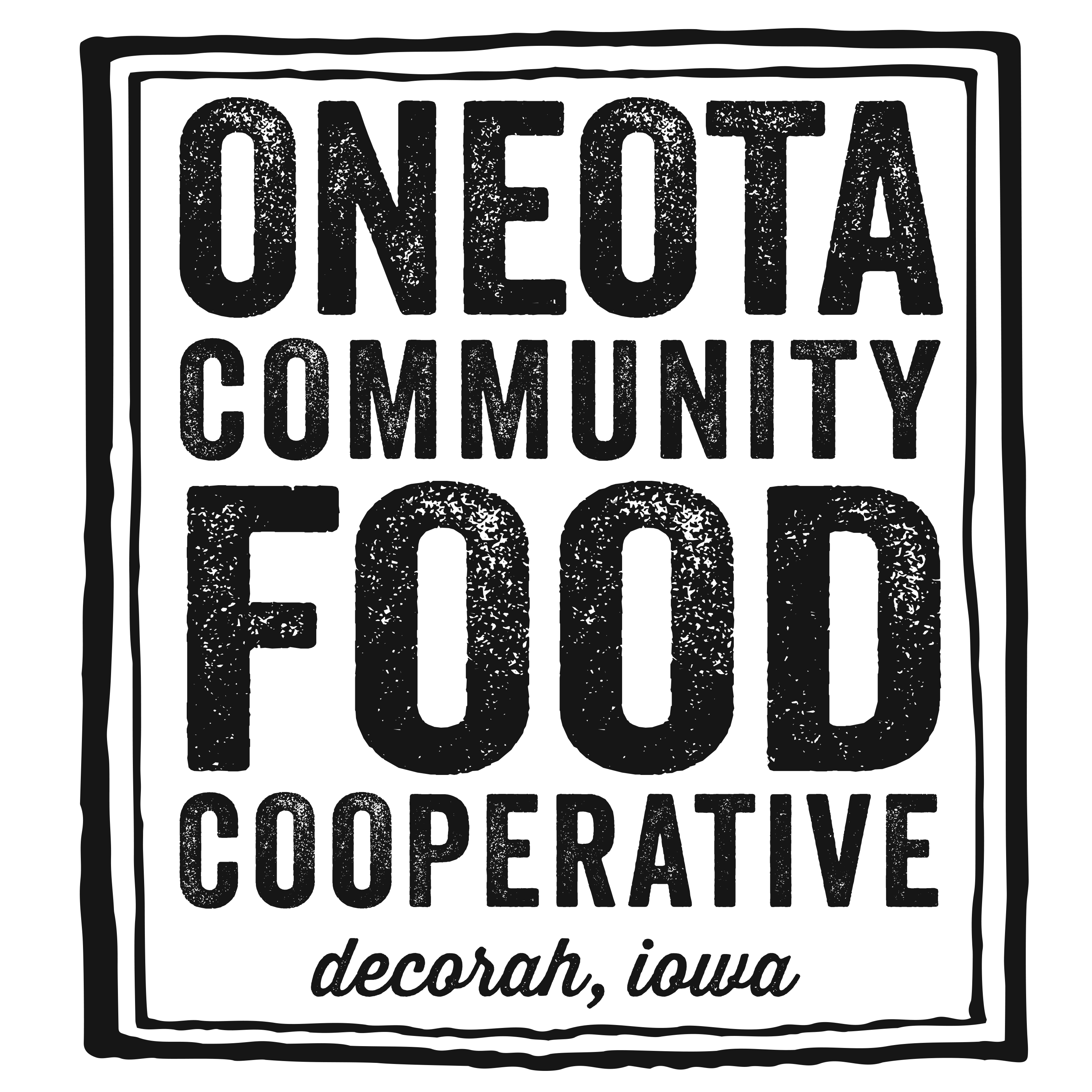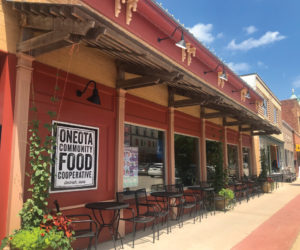By: Beth Hoven Rotto, Cheese & Dairy Buyer
It’s enough to make your head spin. I’m talking about the two doors full of yogurt choices at Oneota Community Co-op. Often I see people standing in front of them, and for good reason. There are a lot of options. As buyer for the Chill department, let me give you a yogurt tour and offer some considerations.
Active Cultures or Not
Yogurt is made by introducing a small amount of active fermentation “starter” to warm milk and letting things culture for several hours. During this time the starter bacteria convert the lactose found in milk, into lactic acid which curdles the milk and gives it a distinctive, tangy flavor. Aside from the flavor, the beneficial cultures in yogurt are one of the good reasons to eat yogurt. But buyer beware. The USDA allows products to be called yogurt that are heat treated after culturing (which is done to prolong shelf life). This process kills all the beneficial cultures and still these products are allowed to bear the words “made with active cultures,” because, yes, they were made with active cultures, but never mind that the active cultures were destroyed later. Be assured that the yogurts sold at Oneota Community Co-op contain active cultures.
The Big or Little Guy
Yogurt is big business and multinational corporations own some of the brands that we carry: Brown Cow and most of the shares in the Stonyfield Farm brand are owned by the Danone Group based in France. Greek Gods is owned by giant Hain Celestial Group. Liberte is owned by General Mills. Fage is a multinational, and Chobani, though privately owned, is a huge international company. Our food co-op may have started purchasing these brands when they were independent, but corporate buy-outs happen so fast and without fanfare that we might not even notice the takeovers. In some cases these brands were built up by food co-ops over the years, and now they have a longstanding following among our members as well as widespread recognition via advertising in print and on television. They are also popular because they go on sale regularly.
You do have other choices, however. Independent companies such as Nancy’s (based in Oregon), Wallaby Organic (northern California), Noosa (Colorado), and Seven Stars (Pennsylvania) make delicious yogurt and are strong companies. Right here, from Iowa, we have two independent companies to choose from: Kalona SuperNatural yogurt, and Country View Dairy.
Organic or Not
Purchasing USDA certified organic yogurt ensures that the cow’s feed was not genetically modified, and that the cows were not given recombinant bovine growth hormone (rBGH). Organic standards also require that during the grazing season a minimum of 30% of the cow’s nutrition must come from pasture. It stands to reason that milk from these cows should be higher in nutrients and antioxidants than cows continuously kept in feedlots. To be certified, no synthetic herbicides or pesticides can to be used at any point and no chemical aids such as de-foamers are allowed in the yogurt production. We offer organic yogurt in these brands: Maple Hill Creamery (new),
Seven Stars, Wallaby Organic, Kalona Supernatural and Stonyfield – and occasionally others .
Local, Regional or Far Flung
Country View is our local yogurt company, located less than 30 miles from our door. Yogurt made on the farm by the Rapson family is rBGH-free, gluten free and naturally sweet, possibly because the milk is pumped less than 200 feet from the milk house to the new (in 2011) creamery. All Country View yogurt is made from 1% milk.
Kalona SuperNatural is about 125 miles from Decorah and produces minimally processed yogurt using certified organic milk. Milk for their yogurt is batch pasteurized, which is a gentle, low heat method relatively rare today. The milk used in this yogurt comes from small farms in the Kalona, Iowa area, largely Amish and Mennonite family farms with an average herd size of 35. Many of the farms ,have been in the family for generations and have never been touched by chemical herbicides or pesticides.
Homogenized or Not
Country View and Kalona SuperNatural yogurt are not homogenized. Homogenization is the process whereby the fat in milk becomes suspended in tiny particles throughout the milk through the use of pressure. There is no nutritional or health benefit to homogenization and it may make milk more difficult to digest. Yogurt made with non-homogenized milk has a layer of cream on the top and is, obviously, one step less processed. Stir in the cream or enjoy the layers. We carry other non-homogenized yogurt including Seven Stars and Stonyfield’s new Oh My Yog!
Greek Yogurt or “Greek style”
The rise of Greek yogurt has been phenomenal. Traditionally, authentic Greek yogurt is strained. The lactic acid that drips away makes the yogurt thicker, less tangy and sweeter. I’ve made it many times. Just dump yogurt onto several layers of cheese cloth, tie the ends together and let it drip for 20 minutes. Other yogurt that I’ll call Greek-style are not strained and have additional ingredients to thicken and stabilize. Greekstyle yogurt can be thickened with a number of ingredients including milk protein concentrate (also used because it is extremely high in protein.) What I didn’t know before writing this article is that some milk protein concentrate is imported from countries where it is not regulated, whereas milk from US Grade A facilities are regulated for purity. I contacted Country View Dairy about the ingredients in their Greek yogurt, and they told me that the nonfat dry milk powder and milk protein concentrate that they use are both Grade A and rBST-free. They choose to thicken their Greek yogurt as opposed straining it due to the acidic whey by-product that can become an environmental issue.
Whole milk yogurt vs. low fat and fat free
There has also been a phenomenal increase in the popularity of whole milk products of all kinds. Recent studies have shown the benefits of whole milk and the public has happily begun to choose whole milk products. So much so that there is, and probably will be, a shortage of whole milk, cream, butter and the like for the foreseeable future. At this time we only receive about 80% of our orders placed. The only thing I can say is that if you had a cow you could either drink whole milk, or you could skim it to make butter or ice cream or whatever you wanted with the cream. But you wouldn’t throw away the skimmed milk, would you? I believe there is a place for low fat and fat free dairy products. Many low fat and fat free yogurts are very creamy and appealing, and are lower in calories.
Sweetened or Unsweetened
Thinking about all of this yogurt makes my mouth water for some of the delicious flavored yogurts that are like rich desserts. My advice is that you take a look at the nutritional labels. Some yogurt is full of sugar and calories. Just so you know.
Non-cow’s milk yogurt
Don’t forget that we carry yogurt made with goat’s milk, soy milk, coconut milk and almond milk as well.
Don’t ask
I still have a lot to learn about yogurt. It’s another case where the more I know, the more I know I don’t know. But I do know that we are fortunate to have many good choices and a lot of variety. But when you are standing in front of the yogurt at Oneota Community Co-op and I say “hello”, please don’t ask me which yogurt is best.
(For some fascinating reading, don’t forget a book I’ve mentioned before, “The Art of Fermentation” by Sandor Katz. He talks about the history of yogurt, describes how to make your own, and much more.)




